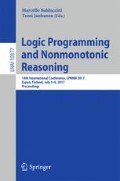Abstract
Parameterized algorithms are a way to solve hard problems more efficiently, given that a specific parameter of the input is small. In this paper, we apply this idea to the field of answer set programming (ASP). To this end, we propose two kinds of graph representations of programs to exploit their treewidth as a parameter. Treewidth roughly measures to which extent the internal structure of a program resembles a tree. Our main contribution is the design of parameterized dynamic programming algorithms, which run in linear time if the treewidth and weights of the given program are bounded. Compared to previous work, our algorithms handle the full syntax of ASP. Finally, we report on an empirical evaluation that shows good runtime behaviour for benchmark instances of low treewidth, especially for counting answer sets.
For additional details and proofs, we refer to an extended self-archived version [8]. A preliminary version of the paper was presented on the workshop TAASP’16. Research was supported by the Austrian Science Fund (FWF), Grant Y698. The first and second author are also affiliated with the University of Potsdam, Germany.
Access this chapter
Tax calculation will be finalised at checkout
Purchases are for personal use only
Notes
- 1.
- 2.
\(\sigma \)
 \(\rho \)
\(\,\mathrel {\mathop :}=\{(x,{\underset{(x,c_1)\in \sigma }{\varSigma }}c_1+ {\underset{(x,c_2)\in \rho }{\varSigma }c_2}) \mid (x,\cdot )\in \sigma \cup \rho \}\); \(\sigma ^+_{r}\,\mathrel {\mathop :}=\sigma \cup \{(r,0)\}\); \(\sigma ^-_{S}\,\mathrel {\mathop :}=\{(x,y) \in \sigma \mid {x\not \in S}\}\).
\(\rho \)
\(\,\mathrel {\mathop :}=\{(x,{\underset{(x,c_1)\in \sigma }{\varSigma }}c_1+ {\underset{(x,c_2)\in \rho }{\varSigma }c_2}) \mid (x,\cdot )\in \sigma \cup \rho \}\); \(\sigma ^+_{r}\,\mathrel {\mathop :}=\sigma \cup \{(r,0)\}\); \(\sigma ^-_{S}\,\mathrel {\mathop :}=\{(x,y) \in \sigma \mid {x\not \in S}\}\). - 3.
We require to add \(\{\leftarrow B_r \mid r\in {{\mathrm{CH}}}(\mathcal{P}), H_r \subsetneq \text {at}_{\le t}\}\) in order to decide satisfiability for corner cases of choice rules involving counterwitnesses of Line 3 in Algorithm 3.
- 4.
References
Abseher, M., Dusberger, F., Musliu, N., Woltran, S.: Improving the efficiency of dynamic programming on tree decompositions via machine learning. In: IJCAI 2015 (2015)
Bodlaender, H., Koster, A.M.C.A.: Combinatorial optimization on graphs of bounded treewidth. Comput. J. 51(3), 255–269 (2008)
Brewka, G., Eiter, T., Truszczyński, M.: Answer set programming at a glance. Commun. ACM 54(12), 92–103 (2011)
Calimeri, F., Faber, W., Gebser, M., Ianni, G., Kaminski, R., Krennwallner, T., Leone, N., Ricca, F., Schaub, T.: ASP-core-2 input language format (2013)
Cygan, M., Fomin, F.V., Kowalik, L., Lokshtanov, D., Marx, D., Pilipczuk, M., Saurabh, S.: Parameterized Algorithms. Springer, Heidelberg (2015)
Eiter, T., Fink, M., Ianni, G., Krennwallner, T., Schüller, P.: Pushing efficient evaluation of HEX programs by modular decomposition. In: Delgrande, J.P., Faber, W. (eds.) LPNMR 2011. LNCS (LNAI), vol. 6645, pp. 93–106. Springer, Heidelberg (2011). doi:10.1007/978-3-642-20895-9_10
Fichte, J.K., Szeider, S.: Backdoors to tractable answer-set programming. Artif. Intell. 220, 64–103 (2015)
Fichte, J.K., Hecher, M., Morak, M., Woltran, S.: Answer set solving with bounded treewidth revisited. CoRR, arXiv:1702.02890 (2017)
Jakl, M., Pichler, R., Woltran, S.: Answer-set programming with bounded treewidth. In: IJCAI 2009, vol. 2 (2009)
Pichler, R., Rümmele, S., Szeider, S., Woltran, S.: Tractable answer-set programming with weight constraints: bounded treewidth is not enough. Theory Pract. Log. Program. 14(2), 141–164 (2014)
Samer, M., Szeider, S.: Algorithms for propositional model counting. J. Discrete Algorithms 8(1), 50–64 (2010)
Sang, T., Bacchus, F., Beame, P., Kautz, H.A., Pitassi, T.: Combining component caching and clause learning for effective model counting. In: SAT 2004 (2004)
Syrjänen, T.: Lparse 1.0 user’s manual (2002). tcs.hut.fi/Software/smodels/lparse.ps
Thurley, M.: sharpSAT - counting models with advanced component caching and implicit BCP. In: SAT 2006 (2006)
Author information
Authors and Affiliations
Corresponding author
Editor information
Editors and Affiliations
Rights and permissions
Copyright information
© 2017 Springer International Publishing AG
About this paper
Cite this paper
Fichte, J.K., Hecher, M., Morak, M., Woltran, S. (2017). Answer Set Solving with Bounded Treewidth Revisited. In: Balduccini, M., Janhunen, T. (eds) Logic Programming and Nonmonotonic Reasoning. LPNMR 2017. Lecture Notes in Computer Science(), vol 10377. Springer, Cham. https://doi.org/10.1007/978-3-319-61660-5_13
Download citation
DOI: https://doi.org/10.1007/978-3-319-61660-5_13
Published:
Publisher Name: Springer, Cham
Print ISBN: 978-3-319-61659-9
Online ISBN: 978-3-319-61660-5
eBook Packages: Computer ScienceComputer Science (R0)


